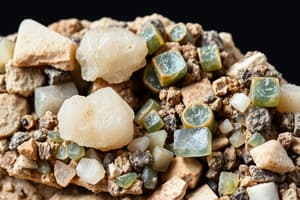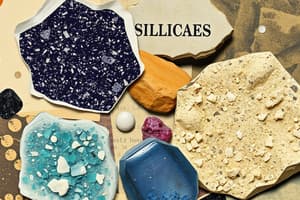Podcast
Questions and Answers
What is the ionic radius of Al+3 in tetrahedral coordination?
What is the ionic radius of Al+3 in tetrahedral coordination?
- 0.26 Å
- 0.39 Å (correct)
- 0.54 Å
- 1.36 Å
Feldspars, zeolites, and ultramarines are classified under which group of minerals?
Feldspars, zeolites, and ultramarines are classified under which group of minerals?
- Inosilicates
- Phyllosilicates
- Nesosilicates
- Tectosilicates (correct)
Which of the following is a main component of Portland cement?
Which of the following is a main component of Portland cement?
- SiO2 (correct)
- Al2O3
- MgO
- Fe2O3
What type of materials are aluminosilicates when they are supercooled?
What type of materials are aluminosilicates when they are supercooled?
What transformation occurs when calcium hydroxides convert in cement?
What transformation occurs when calcium hydroxides convert in cement?
Which statement about zeolite applications is incorrect?
Which statement about zeolite applications is incorrect?
What unique property do borosilicate glasses possess?
What unique property do borosilicate glasses possess?
Who coined the term 'silicone'?
Who coined the term 'silicone'?
What was Kipping's initial description of the products he obtained from silicone polymer synthesis?
What was Kipping's initial description of the products he obtained from silicone polymer synthesis?
Which of the following methods is considered an economically viable alternative to the Grignard method for synthesizing organochlorosilanes?
Which of the following methods is considered an economically viable alternative to the Grignard method for synthesizing organochlorosilanes?
Which type of silicone polymer is characterized by a three-dimensional structure?
Which type of silicone polymer is characterized by a three-dimensional structure?
What is the end product of the hydrolysis of SiCl4?
What is the end product of the hydrolysis of SiCl4?
What is the result of the reaction where Me2SiCl2 undergoes hydrolysis?
What is the result of the reaction where Me2SiCl2 undergoes hydrolysis?
What is the basic building block of all silicate minerals?
What is the basic building block of all silicate minerals?
Which statement correctly describes the bond character in Si—O bonds?
Which statement correctly describes the bond character in Si—O bonds?
Why cannot soluble silicate be used with hard water?
Why cannot soluble silicate be used with hard water?
What is the typical valence of the cations that partner with isolated (SiO4)4− tetrahedra in nesosilicates?
What is the typical valence of the cations that partner with isolated (SiO4)4− tetrahedra in nesosilicates?
What percentage of minerals in the Earth's crust are silicates?
What percentage of minerals in the Earth's crust are silicates?
Which mineral is an example of a sorosilicate?
Which mineral is an example of a sorosilicate?
What is the basic structural unit of the amphibole group of minerals?
What is the basic structural unit of the amphibole group of minerals?
What geometric shape does the [SiO4]4− tetrahedron take?
What geometric shape does the [SiO4]4− tetrahedron take?
Which of the following describes the structural formula for pyroxenes?
Which of the following describes the structural formula for pyroxenes?
Which silicate group shares one of its corner oxygens with another tetrahedron?
Which silicate group shares one of its corner oxygens with another tetrahedron?
What percentage of all known minerals are classified as silicates?
What percentage of all known minerals are classified as silicates?
Which mineral is the most important source of beryllium?
Which mineral is the most important source of beryllium?
Which statement correctly describes phyllosilicates?
Which statement correctly describes phyllosilicates?
Which of the following is a characteristic of tectosilicates?
Which of the following is a characteristic of tectosilicates?
What type of silicate structure does the mineral Talc represent?
What type of silicate structure does the mineral Talc represent?
What is the lowest glass transition temperature of silicone polymers?
What is the lowest glass transition temperature of silicone polymers?
Which of the following is NOT a type of silicone polymer?
Which of the following is NOT a type of silicone polymer?
What property makes silicones suitable as low temperature lubricants?
What property makes silicones suitable as low temperature lubricants?
Which catalyst can be used to produce silicone polymers?
Which catalyst can be used to produce silicone polymers?
For what application are silicones used due to their high thermal stability?
For what application are silicones used due to their high thermal stability?
What feature of silicone materials contributed to the success of the first human footprint on the moon?
What feature of silicone materials contributed to the success of the first human footprint on the moon?
Which of the following describes silicone rubbers?
Which of the following describes silicone rubbers?
What is one of the key benefits of using silicones in electric wiring?
What is one of the key benefits of using silicones in electric wiring?
Flashcards are hidden until you start studying
Study Notes
Silicon Compounds
- Silicon differs from carbon in terms of structure and reactivity; SiO2 is a network solid, while CO2 is a gas.
- SiCl4 reacts with water, whereas CCl4 does not, showcasing silicon's reactivity.
- Silane alcohol dehydration results in polymers, non-analogous to carbon alkenes.
Silicates and Their Prevalence
- Earth's crust predominantly consists of Oxygen (O) and Silicon (Si), with over 90% of minerals being silicates.
- Silicates account for 27% of known minerals and 40% of common minerals.
Silicate Characteristics
- Majority of silicates are insoluble due to their infinite polymeric structure and stable Si-O bonds.
- The building block of silicates is the [SiO4]4− tetrahedron; silicon has a +4 oxidation state and oxygen -2.
Silicate Formation and Use
- Soluble silicates can form by fusing metal carbonates with sand at high temperatures (1400°C).
- Used in liquid detergents to maintain high pH but inefficient in hard water due to insoluble calcium silicate formation.
Silicate Structure Principles
- Silicates exhibit an infinite ionic polymer structure with a Si-O bond that is 50% ionic and 50% covalent.
- Silicon's ionic radius is 0.26 Å, while oxygen's is 1.36 Å, leading to an ionic Si:O radius ratio of 0.21.
Silicate Anions
- Nesosilicates (Isolated Tetrahedra): Composed of X2(SiO4) units; examples include Olivine (Mg, Fe)SiO4.
- Sorosilicates (Double Island): Sharing one oxygens forming Si2O7-6, e.g., Hemimorphite.
- Cyclosilicates (Ring Silicates): Arranged in rings, formula (SiO3)n2n-, e.g., Beryl.
- Inosilicates (Single/Dual Chain Silicates): Long chains of SiO4 linked by sharing oxygens, e.g., Pyroxenes, Amphiboles.
- Phyllosilicates (Sheet Silicates): Forming infinite sheets with the basic unit Si2O5-2, e.g., Mica, Talc.
- Tectosilicates (3D-Framework): All oxygens shared, forming a three-dimensional lattice, e.g., Quartz.
Role of Aluminum in Silicates
- Aluminum can substitute silicon in silicate structures, leading to aluminosilicates and borosilicates.
- Replacement of Si+4 with Al+3 introduces negative charges balanced by other cations.
- Key groups include Feldspars, Zeolites, and Ultramarines.
Applications of Silicates
- Cement: Mixture of Ca-silicates and aluminates; Portland Cement consists largely of CaO and SiO2.
- Glass: Consists of aluminosilicates; can be molded and drawn into fibers. Borosilicate glass is especially heat-resistant.
- Silica Gel: Used in chromatography.
Silicone Polymers
- The term "silicone" was first coined by J Stanley Kipping in the early 1900s.
- Silicones are strong, stable compounds widely utilized in fluids, elastomers, and resins.
Silicone Synthesis
- Strong Si-C bonds; forms pπ-dπ bonds.
- Prepared via Grignard reagents or organolithium compounds.
- Rochow-Mueller Process is an economically viable production method for organochlorosilanes.
Properties and Uses of Silicones
- Silicones are stable, non-volatile, and maintain low viscosity at high temperatures.
- Used for insulation, low-temperature applications, and storing chemicals due to their high thermal and chemical stability.
- Notably used in environments with extreme temperatures, such as the moon mission footwear.
Studying That Suits You
Use AI to generate personalized quizzes and flashcards to suit your learning preferences.




